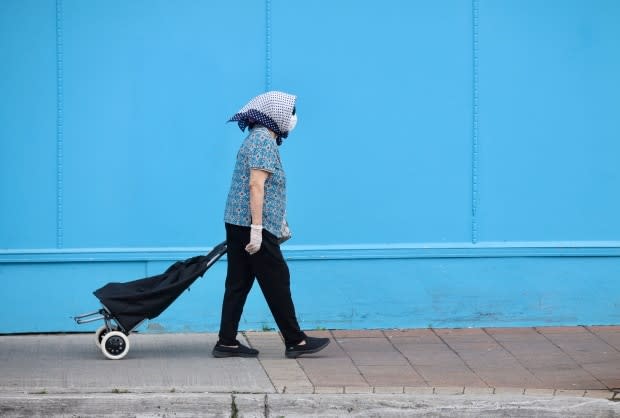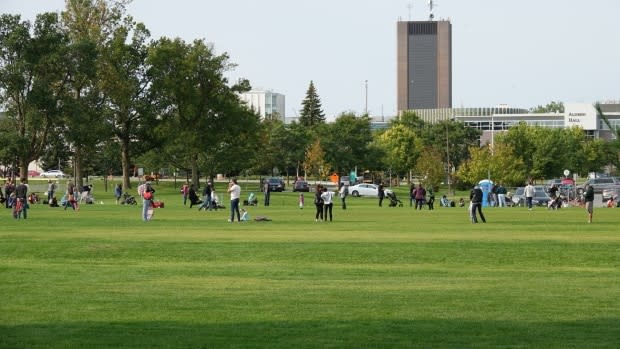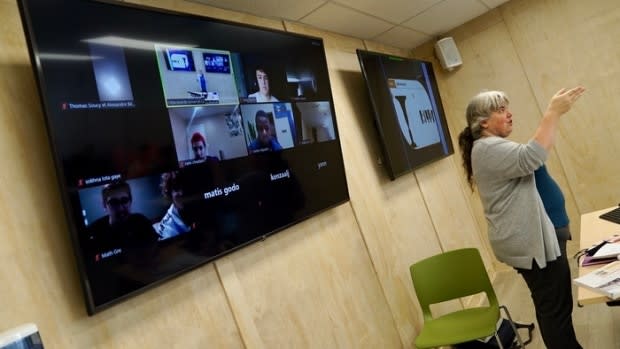What you need to know about COVID-19 in Ottawa on Saturday, Sept. 19

Recent developments:
What's the latest?
Public health officials confirmed another 55 COVID-19 cases Saturday in Ottawa and one new death.
The city's death toll from the virus now stands at 268.
The latest numbers come as Ottawa's medical officer of health, Dr. Vera Etches, says the city is in its second wave of the COVID-19 pandemic.
After two months of giving warnings, Ottawa bylaw officers will begin ticketing individuals and businesses if they don't follow the rules that require masks in indoor public spaces.
Health officials in Ottawa are optimistic the city's three new provincially funded COVID-19 mobile test units will help address the number of people overwhelming the existing assessment centres.
WATCH: Rapid rise in cases triggering second wave:
Two of the three units will travel to schools depending on the need. The third will be moved among Ottawa's existing sites as necessary to expand capacity.
This weekend it will be at the Brewer Arena testing site, where some people have been reporting three- to four-hour waits.
Premier Doug Ford said Friday he hopes pharmacies can start administering COVID-19 tests by the end of next week.
The Ontario Pharmacists Association (OPA) told CBC Friday that Ottawa will likely be one of the locations where the new testing plan would be rolled out first.
Police across Quebec will check more than a thousand bars and restaurants this weekend to make sure health rules are being followed, particularly crowd limits and masks.
This week that province banned sales of food and drink after midnight.
WATCH LIVE | Ontario, Quebec premiers talk to media:
How many cases are there?
Testing has confirmed 3,604 people in Ottawa have had COVID-19.
Of those, 484 are active cases, 2,846 are considered resolved and 274 have died.
Overall, public health officials have reported more than 5,500 people with COVID-19 across eastern Ontario and western Quebec, with more than 4,400 of them considered resolved.
COVID-19 has killed 104 people in the region outside Ottawa: 52 people have died in Leeds, Grenville and Lanark counties, 34 in the Outaouais and 18 in other parts of eastern Ontario.
What's open and closed?
Starting immediately, private unmonitored gatherings across Ontario will be limited to 10 people indoors and 25 people outdoors for the next 28 days, Premier Doug Ford announced at a news conference at Queen's Park Saturday.
Three COVID-19 hot spots — Ottawa, Toronto and Peel Region — were put under the same restrictions earlier this week.
Test sites in and around Ottawa have been very busy this week and wait times have been very long, with some reaching their daily capacity well before their usual closing time.
Ottawa's test site on Moodie Drive was at capacity by its official opening time of 9 a.m. on Friday, according to the Queensway Carleton Hospital.
Kingston, Ont., has tightened its distancing rules in city parks and increased fines.
Ottawa will resume ticketing drivers who park longer than allowed in unmarked areas on Oct. 1, with warnings starting Monday.
Quebec has similar reopening rules to most of Ontario, with its cap on physically distanced gatherings in public venues now up to 250 people, allowing smaller festivals.
That province has warned some regions are close to having gathering sizes shrunk and losing dine-in service at restaurants.
Every local school board or service centre has now brought students back.
More than 2,000 students in Ottawa's English school boards don't have their usual school bus because of a shortage of bus drivers.
Distancing and isolating
The novel coronavirus primarily spreads through droplets when an infected person coughs, sneezes, breathes or speaks onto someone or something.
People don't need to have symptoms to be contagious.
That means physical distancing measures such as working from home, meeting others outdoors as much as possible and keeping distance from anyone you don't live with or have in your social circle, including when you have a mask on.
WATCH | Prominent COVID-19 benefit ending soon:
Ottawa's medical officer of health is pleading with residents to reduce the number of people they're in close contact with as new cases of COVID-19 continue to surge.
Masks are now mandatory in indoor public settings in all of eastern Ontario and Quebec, including transit services and taxis in some areas.
Quebec has given police the power to fine people ignoring mandatory mask laws.
Masks are also recommended outdoors when you can't stay the proper distance from others.

Anyone who has travelled recently outside Canada must go straight home and stay there for 14 days.
In Ontario, that's the same period of self-isolation for anyone with symptoms. When self-isolating, only leave home or see other people if it's critically important, such as to go see a doctor.
Most people with a confirmed COVID-19 case in Quebec can end their self-isolation after 10 days if they have not had a fever for at least 48 hours and has had no other symptom for at least 24 hours.
Health Canada recommends older adults and people with underlying medical conditions and/or weakened immune systems stay home as much as possible.
What are the symptoms of COVID-19?
COVID-19 can range from a cold-like illness to a severe lung infection, with common symptoms including fever, a cough, vomiting and the loss of taste or smell.
Less common symptoms include chills, headaches and pinkeye. Children can develop a rash.
Getting tested any sooner than five days after potential exposure may not be as useful since it takes about that long for the virus to grow to be detectable by a test, said Ottawa's medical officer of health Vera Etches in early September.
If you have severe symptoms, call 911.
Where to get tested
In eastern Ontario:
In Ottawa any resident can get tested, but record wait times have led Ottawa Public Health (OPH) to ask that testing be limited for now to people with symptoms or who have been referred for a test because of contact tracing.
Testing for the general public happens at one of four sites, with health officials promising more capacity soon.
Inuit in Ottawa can call the Akausivik Inuit Family Health Team at 613-740-0999 for service, including testing, in Inuktitut or English on weekdays.
There is a pop-up clinic at the Wabano Centre in Vanier Monday and Tuesday.
The University of Ottawa has a test site open weekdays by appointment at its Lees campus for students and staff.
There's also a mobile testing van operated by Inner City Health that mostly serves people experiencing homelessness and some tests done in hospitals.

In the Eastern Ontario Health Unit, there is a drive-thru centre in Casselman and walk-up site in Hawkesbury and Winchester that don't require people to call ahead.
Others in Alexandria, Rockland, Cornwall and now Winchester require an appointment.
In Kingston, the Leon's Centre is hosting the city's test site though Gate 2. There's another test site at Queen's University's Mitchell Hall open 5 to 8 p.m. on weekdays.
Napanee's test centre is open daily for people who call ahead.
You can arrange a test in Bancroft, Belleville or Trenton by calling the centre and in Picton by texting or calling. Only Belleville and Trenton run seven days a week.
The Leeds, Grenville and Lanark unit asks you to get tested if you have a symptom or concerns about exposure.
It has a walk-in site in Brockville at the Memorial Centre and testing sites in Smiths Falls and Almonte which require an appointment.
Renfrew County residents should call their family doctor and those without access to a family doctor can call 1-844-727-6404 to register for a test or if they have health questions, COVID-19-related or not.
People can also visit the health unit's website to find out where testing clinics will be taking place each week.
In western Quebec:
Outaouais residents can get a walk-in test in Gatineau seven days a week at 135 blvd. Saint-Raymond.
There are recurring clinics by appointment in communities such as Gracefield, Val-des-Monts and Fort-Coulonge.
They can call 1-877-644-4545 to make an appointment or if they have other questions.

First Nations:
Akwesasne has had 14 confirmed COVID-19 cases, most linked to a gathering on an island in July.
It has a mobile COVID-19 test site available by appointment only. Anyone returning to the community on the Canadian side of the international border who's been farther than 160 kilometres away — or visited Montreal — for non-essential reasons is asked to self-isolate for 14 days.
In early September, it expanded its gathering limit to 50 people, then ended its curfew. Its schools start bringing students back next week.
Anyone in Tyendinaga who's interested in a test can call 613-967-3603 to talk to a nurse.
People in Pikwakanagan can book an appointment for a COVID-19 test by calling 613-625-2259.
For more information


